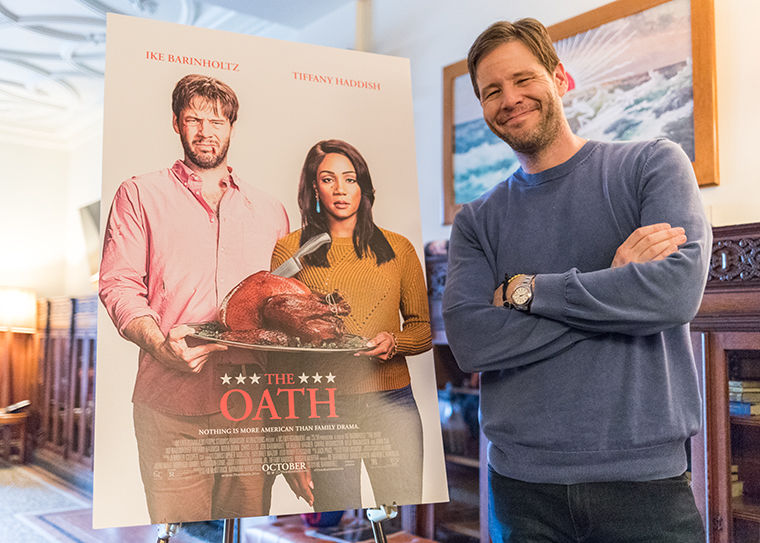Ike Barinholtz pledges allegiance to satire
Ike Barinholtz, director, writer and star in The Oath discusses the inspiration behind the movie and how he hopes it will impact the views on Friday, Oct. 19 when it hits theatres.
October 15, 2018
The turkey is on the table, in-laws are chattering, cousins are running around and White House agents are urging everyone to sign an oath of loyalty to the president of the United States.
Happy Thanksgiving from comedian Ike Barinholtz, writer and director of “The Oath,” a comedy and drama-thriller about family, politics and the holidays, now in theaters citywide.
Barinholtz stars in the film as Chris, a high-anxiety news junkie hosting his sparring relatives in an age of political divide.
In an Oct. 1 interview with The Chronicle, Barinholtz discussed balancing genres, the news cycle and coming home for the holidays.
THE CHRONICLE: What inspired you to make this film?
BARINHOLTZ: After the 2016 election, we did a big Thanksgiving at my house, and after dinner we were having a few drinks and my mom and my brother and I got into a pretty spirited discussion that turned into an argument. I woke up the next morning and said to my wife, “If we got into that fight, and we are all on the same side and voted for the same person, what is going on at some other tables?” I knew the arena of the family holiday table had been changed forever in America, and there was no going back on that.
How do you balance comedy and tragedy?
Every day when I check Twitter. When you see a funny video of a dog pulling down someone’s pants, and then you go and watch something like a child being separated from a mother at the border and start crying. I feel like we live in a roller coaster era. I knew it was going to be a different movie in terms of tone. There are movies that I have really loved in the past that mark that line of bloody, sad, funny and uplifting. The challenge was balancing it; if we don’t balance it, and we just make a straight up comedy, then people would say we are not giving enough gravity to this serious situation.
How do you balance what you watch on the news and how you consume it?
It’s something I’m working on. I was much like my character—really obsessed with the news cycle, especially the year before and the year after the election. I was just consuming way too much. You can think of it like coffee. If you drink 50 cups of coffee a day, you are going to have a heart attack.
It’s been almost two years since the election. Has anything about the film changed since you wrote it, and do you think it has become more relevant?
Conceptually, structurally and tonally, it’s very similar to what we set out to do. Throughout every step of the process, things were happening in the news that were starting to echo what we were doing. During the writing process, I turned on the news one day, and there was this macabre cabinet meeting where they all sat with the president and said, “I’m proud to work for you,” and “I will be loyal to you,” and it was strange. After we shot [the movie], there was something called National Loyalty Day. We have a president that is so obsessed with loyalty he tweets about it. It was life copying art that was already copying life. All it did was reinforce our thinking that we need to get this movie out right now. There’s a sense of urgency here.








